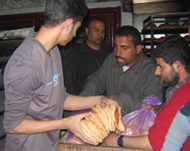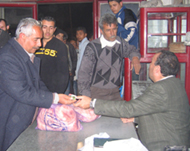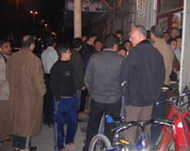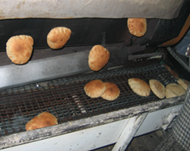Untitled Document
 |
|
Gazans stock up bread on Saturday. Photo/Laila el-Haddad
|
Wheat-flour stocks have run out in the Gaza Strip, with most bakeries
closing and the United Nations warning of a looming humanitarian crisis after
a nearly two-month commercial closure of Gaza imposed by Israel.
Gaza's 1.5 million Palestinians face an unprecedented food shortage because
of Israeli closures that have prevented the import of wheat, the United Nations
Office for the Coordination of Humanitarian Affairs in the Occupied Palestinian
Territories (OCHA) said on Sunday.
"The situation is extremely serious," David Shearer, OCHA's head
of operations, told Aljazeera.net. "In the next day or so all bread supplies
will dry up.
"There is very little else around in terms of rice, which is also
short in supply. Bread is the staple diet for Palestinians. It is also the food
of the poorest people, so if that's not available, people will start to go hungry,"
Shearer said.
According to the World Bank, 65% of Gazans live below the poverty line,
surviving on less than $2 a day.
"What we were warning before was that stocks were getting low. Today we
are saying stocks are gone, and the end-point has been reached," Shearer
said.
Emergency stocks depleted
 |
|
Bakeries limited the amount of
bread. Photo/Laila el-Haddad
|
The United Nations Relief and Works Agency and the World Food Programme have run
out of emergency flour stocks, he said.
The Al-Mintar (Karni) crossing is Gaza's commercial lifeline, the only
point through which large-scale import of wheat and other goods can take place.
The crossing has been closed for nearly 50 days this year, a total of 60% of
the time, according to the UN.
The financial losses to the Palestinian economy are estimated at $500,000 a
day.
The crossing was opened sporadically during the closure, but 3594 metric tonness
of wheat flour contracted to local mills was unable to enter Gaza during this
time, the World Food Programme said.
According to the Ministry of Economy, Palestinians in Gaza consume about 350
tonnes of flour a day, but all flour mills have shut down because of the depletion
of wheat stocks, and bakeries are working through their last bags of stored
flour.
Long lines
 |
|
Customers line up to buy bread
on Saturday. Photo/Laila el-Haddad
|
As word of the shortage spread, long lines formed through the night in front of
the few bakeries still open for business, with residents flocking there to buy
bread and flour for families under the roars of Israeli warplanes circling Gaza's
skies.
Bakery owners were rationing bags of bread they had baked with the limited
flour stocks in their emergency storage. In some instances, fights broke out
between desperate customers.
"My husband waited for three hours to buy a bag of flour so we can bake
at home, and all the bakeries have closed in our town. We don't know what we
will do in a few days" said 50-year-old Um Ramadan, who has an eight-member
family.
The UN says the usual 30- to 60-day wheat stock has been exhausted, and other
basic food commodities, such as dairy products and fruit, are in short supply.
Rice and sugar are selling at more than twice their normal price and are difficult
to find in stores, while prices of local vegetables marked for export, such
as tomatoes and green peppers, have plummeted.
'On a diet'
 |
|
Bread is a staple for Gazans.
Photo/Laila el-Haddad
|
Nabil Abu Rudeinah, a spokesman for the Palestinian president, criticised the
closure of the border crossing.
"Israel must realise it cannot starve the Palestinians," he said.
"The situation is critical and we cannot accept it. We have asked the Americans
to intervene."
Dov Weisglass, the Israeli prime ministerial adviser, recently described
the Israeli sanctions policy after Hamas's January election victory as one in
which Palestinians would be "put on a diet", but not starved to death.
The United Nations has condemned the closure and noted that 40% of
children in the Gaza Strip suffer from malnutrition and that under the fourth
Geneva Convention, Israel, as an occupying power, is responsible for the welfare
of Palestinians in the Gaza Strip.
Israeli authorities say the crossing has been closed because of security threats,
specifically, fears that tunnels had been built under the crossing. Palestinians
have rejected such claims, saying the closure is politically motivated.
In a news conference on Sunday at the Rafah crossing, Mahmoud Abbas, the Palestinian
president, told reporters that the PA will meet with Israeli, Egyptian and American
delegates today to try to resolve the issue.
"The meeting will have to do with all issues related to Rafah, and imports
and exports. We realise there is a serious problem now in Gaza in regard to
food shortages, and that will also be examined today, and we hope to find a
solution to it. We will also take a serious look at security protocols, so this
border can be opened continuously," Abbas said.



